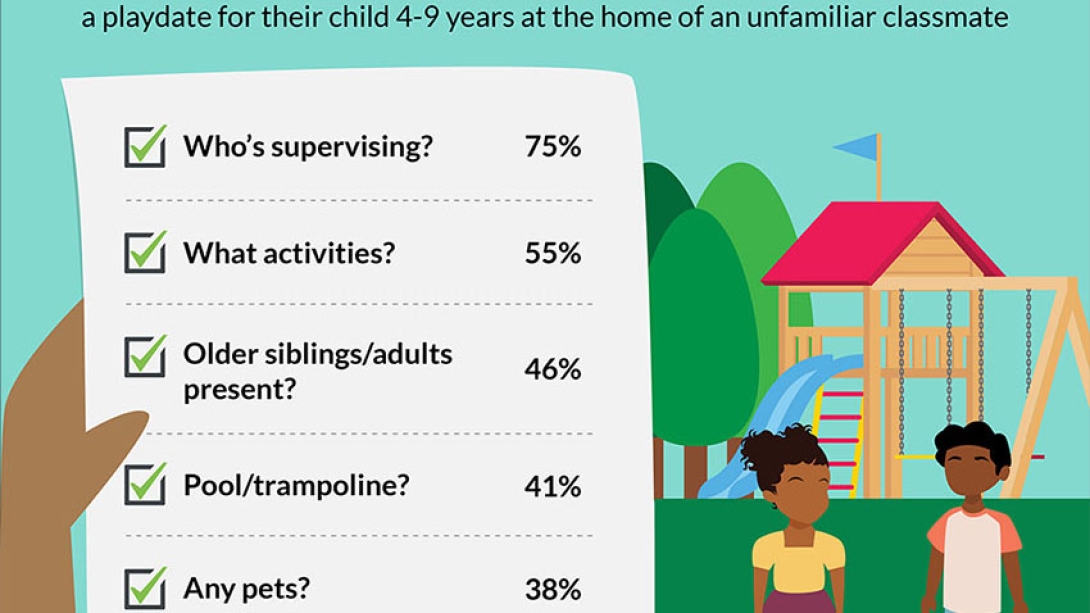A Mott pediatrician advises parents to follow this checklist before sending their child to another family’s home to help everyone feel safe and comfortable.
5:00 AM
Author |

As children make new friends during the school year, many may also receive playdate invitations – and sometimes it's between families who don't know each other.
Parents may be hesitant to accept such invites, with nearly half saying they have declined a playdate because they didn't feel comfortable leaving their child in the other parent's care, according to the C.S. Mott Children's Hospital National Poll on Children's Health at the University of Michigan.
Despite concerns, just 1 in 4 parents polled have been asked about safety issues by another parent before a playdate.
"Playdates are a normal and healthy part of childhood. These are opportunities for children to develop independence, gain social experiences and of course have fun with friends. But parents are sometimes uneasy about sending their kids to another family's home," says Mott pediatrician Jill Noble, M.D., who practices at the U-M Saline Health Center.
LISTEN UP: Add the new Michigan Medicine News Break to your Alexa-enabled device, or subscribe to our daily updates on iTunes, Google Play and Stitcher.
"Few parents seem to be proactively addressing their concerns with the other parents," she adds of the poll's findings. "Parents may feel uncomfortable starting that conversation because they don't want to offend the other family or aren't sure how to bring up certain topics."
Parents' top concerns about playdates include children being unsupervised, hearing inappropriate language, getting into medications and harmful substances, and getting injured, according to the poll.
Noble says certain questions should be on every parents' checklist before agreeing to a playdate to help both children – and their parents – feel more comfortable.

Can we meet ahead of time?
One of Noble's top recommendations is for families to start with a playdate together at a neutral spot, such as a park or indoor playground. This gives parents the chance to sit down, get to know each other and talk about different concerns.
"Parents may be able to get answers to certain questions in a more natural way without feeling like they are grilling the other parents or giving them the third degree," she says.
The host parent may also want to learn about the guest child. It's helpful to know, for example, if the child coming over is shy, hyper, afraid of animals or has food allergies. Parents might also consider staying during the first playdate at the other family's home.
Who will be watching the kids?
It's important for parents to know who's responsible for supervising the children as well as who else will be there.
"You would want to know, for example, if the family often leaves a 13-year-old home alone with her 8-year-old sibling." An opener may be: "So will you be the one hanging out with these guys today?"
Some parents in the Mott Poll also said they would try to learn about members of the host family by asking friends, neighbors and teachers, checking social media or searching sex offender registry/criminal records.
One of the most critical steps to take before a playdate is to talk to your child. We should be teaching our kids what to do in these types of situations anytime anywhere.Mott pediatrician Jill Noble
What will the kids be doing?
If kids will be involved with potentially-unsafe activities, such as using trampolines and pools, parents should ask about the family's rules.
For example, how many children are allowed to jump on the trampoline at a time and is there protective netting? If there's a pool, parents may say something like "my son isn't a strong swimmer so I would prefer he not go near the water," or "I see there's a pool in the backyard. Are they going to be outside?"
MORE FROM MICHIGAN: Sign up for our weekly newsletter
Other questions may be whether the children will be staying at the house or leaving – and if the latter, who might be driving and if the vehicle has appropriate child car seats for all children. Parents may also want to check on screen time rules and what movies or video games the family allows.
Do you have a gun in the house?
"The gun question can be very touchy, but it's an important one," Noble says. She recommends a soft opener like "My child hasn't been around weapons before. Is that something he may come into contact with at your house?"
"I think if it's done in a non-confrontational way, many families would be happy to provide reassurance that weapons, medications and other harmful substances are safely stored away from where children will be," Noble says.
But it's also important for parents to talk to children about what to do if they saw a gun or if their friend started playing with one. "Make clear to your child that 'if you see a gun, don't touch it. If someone else is touching it, leave the situation and go tell an adult,'" Noble says. Same with medications and other unsafe substances.
What animals are in the home?
Openers may include "My child isn't normally around animals. Do you have any pets?" Or "my child had a bad experience with a dog once. Do you have one?"
But it's also important to teach children animal safety rules, like not touching an animal who is eating or pet it unless an adult is nearby and says it's OK.
"Animals can be unpredictable. A dog who has been a loving pet to a family may suddenly snap with a stranger," Noble says.
Are you aware of food allergies?
Families of children with allergies are often pros when it comes to communicating their child's health needs. But host families without allergies may not be aware of all the do's and don'ts or know that certain foods may have had cross contamination with an allergen.
"Families should discuss allergies ahead of time and be prepared to respond if the child is accidentally exposed for any reason," Noble says. Families might also bring their own snacks and ask that their child only eat those.
What would you do if you felt unsafe?
The most important questions, Noble says, should be directed to the children themselves. Parents should discuss safety rules with children ahead of time to make sure they know what to do if they feel unsafe or uncomfortable. This should include specific guidance on pool and trampoline rules, body safety, screen time rules, street safety and what to do if they come across a weapon. Parents may role play with their child to practice their response.
"One of the most critical steps to take before a playdate is to talk to your child," Noble says. "We should be teaching our kids what to do in these types of situations anytime anywhere."

Explore a variety of health care news & stories by visiting the Health Lab home page for more articles.

Department of Communication at Michigan Medicine
Want top health & research news weekly? Sign up for Health Lab’s newsletters today!





